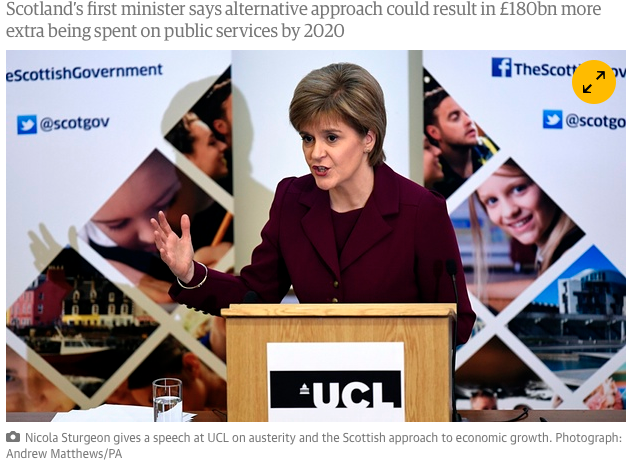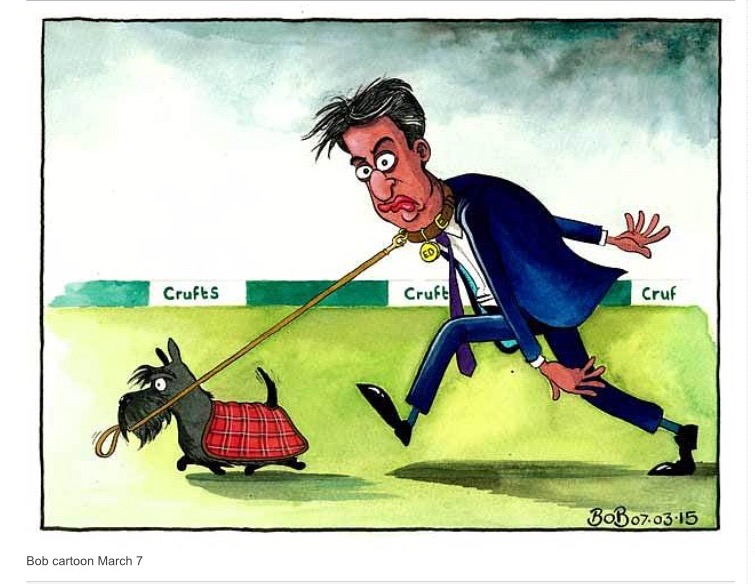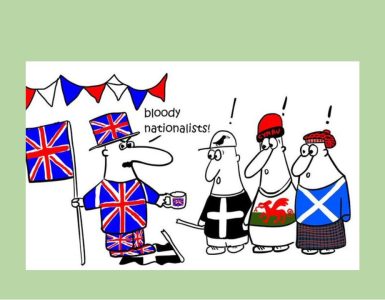Lots of people have been waiting for Mhairi Black’s maiden Commons speech. When it came it was a cracker! Watch it here :
There has been a hugely enthusiastic response to Mhairi Black, MP. She gained praise from all round the House of Commons which is no mean achievement in itself. Her speech has gone viral on social media. Ten million views on various online websites.
The press is giving us its views. Radio4 have done a Profile on Mhairi. I’m impressed that the presenter didn’t bother to define “blootered”. 🙂
Deborah Orr has written a piece in the Guardian entitled “Mhairi Black is inspiring, wonderful – and utterly wrong” saying that although she delivered a superb speech Mhairi failed to understand that Labour and the SNP cannot be allies. She starts off by saying:
“The hard problem, as Greece knows, isn’t promising to end austerity – it’s coming up with a credible plan to do so. If the SNP has one, and if it really wants to create an effective opposition in tandem with Labour, then it really ought to start spilling the beans on precisely what the plan is.”
This seems a tad ingenuous to say the least. In the run up to the general election, Nicola Sturgeon put a great deal of effort into spelling out just that – an SNP budgetary strategy for the UK which would allow small, 1%, but steady growth in the economy, while also making improvements and efficiencies to our public spending and diminishing the budget deficit although over a longer time period. She even went down to UCL to make the speech and in fact her criticism of austerity was fully reported in the Guardian! In a later speech at LSE , she expanded on this theme, comparing and contrasting the approach in Holyrood and in Scottish society more broadly with that in Westminster.
Orr also said
“I don’t doubt Black’s sincerity in extending the hand of friendship to Labour. I share her disgust at Harriet Harman’s airy announcement that Labour will back the Tories’ benefit changes. But I also find it irritating that Black’s sincerity seems to include a sincere failure to understand that the SNP is not Labour’s most natural ally in Westminster, but Labour’s most insidious opponent. The vast majority of the UK electorate doesn’t want a Labour-SNP alliance to be the chimerical alternative to the Conservatives in Britain. And the vast majority of the UK electorate can only reject Labour to stop that from happening.”
I think she has a point here. Rightly or wrongly, I think wrongly, the majority of English voters – and I do mean English – did not seem to want an allegiance, even informal, between Labour and the SNP. This leaves most of us Scots scratching our heads in perplexity since there is a large overlap in policy between the two parties. And the SNP made it plain that a vote for them in the election was not a vote for Scottish Independence. And aren’t we all united in opposing the Tories?
But then consider the way the media covered this possible ‘arrangement’ before the election…
cartoons with Miliband in Alex Salmond’s breast pocket (this despite the fact that he had stood down as SNP leader about six months before); of Miliband being led along on a lead by a little Scottie dog. A bit reminiscent of the Commonwealth Opening ceremony we all thought though it was drawn as if at Crufts; of Miliband as a puppet with Sturgeon pulling the strings. Well, yes , they were funny. Actually they were very funny. But they weren’t fair. They weren’t informative. They played on undercurrents of English xenophobia. The Telegraph cartoonists enjoyed themselves. One was tweeted from Tory Party HQ.

But does all this make the SNP Labour’s insidious opponent? Is it true that any chimerical (great word that, by the way) alliance will be rejected by English voters in the only way it can, by voting Tory. I’ve trying to answer this and come to the conclusion that it can’t be answered from a UK perspective, only from a Scottish or English one.
It can be answered from a Scottish perspective, where it’s pretty straightforward really. We vote – predominantly – for left-of-centre political parties and even the Scottish Tories are a tad more left than their English counterpart. We’re well used to that strategy being thwarted as the English vote in the Tory & Unionist Party but we put up with it because that’s how democracy works and we’re part of the UK. Up here we have a choice between Labour or SNP. Irrespective of whether we want Scotland to become independent, we know that the SNP will further our left-of-centre aspirations. We also know they are well used to working in alliance with other parties because they have had to do that at Holyrood. (So has Scottish Labour and Scottish LibDems) In recent years, UK Labour has moved further right than we like so we’ve been voting SNP in increasing numbers for Holyrood, to the point when, in 2011, they gained an overall majority there. No mean feat with a voting system designed to prevent overall majorities.
Add to this background context a Labour Party which spent two years in the Independence Referendum Campaign on the same platform as the Tories working to keep the UK united. They all told us we were better together and that we Scots should not just stay in the Union but come and help lead it. So said Cameron while Darling and Miliband looked on and applauded. Actually most of us up here think we’ve been leading the Union, not to mention the Empire, for centuries. Certainly we’ve been sending our most talented politicians down south for centuries. But still it’s nice to be included and appreciated, isn’t it. Of course we didn’t like seeing Labour sharing platforms with Tories. And we didn’t like the underhanded tricks they got up to. And we didn’t like the biassed media coverage. So when they won, lots of us joined SNP or Greens just to remind them not to expect us to act as if nothing had happened in Scotland over those two years.
And we’re not daft. We understand that the English electorate are not as left-leaning as we are. We understand that Labour policy has to reflect that. We understand that in an informal allegiance with Labour in Westminster, we wouldn’t get everything we’d like. We are also well aware of the acrimony from Scottish Labour towards the SNP for having intruded into their ‘traditional’ Scottish territory. We even understand that Miliband might keep his cards close to his chest on this until the vote was over. But still it seems a no-brainer to us that SNP people we send to Westminster would be well able to support and work with a Labour government. What’s the problem? Why would an English Labour supporter consider voting Tory (or UKIP for god’s sake) to stop Labour working in a Progressive Alliance with SNP, the Greens and Plaid Cymru in Westminster? Not to mention the Lib Dems, poor souls.
Swapping over to a possible English perspective. I suppose it’s true that if you want to stop a Progessive Alliance involving the SNP you have to vote Tory. The FPTP voting system doesn’t allow for smaller parties, like the Greens, gaining actual representation at Westminster. There’s no English left-of-centre alternative to Labour, unless you count the LibDems. (BTW I think they’ve had a raw deal from England for all the effort they made reining in the Tories whilst in the Coalition.) All this is only relevant when support for Labour is languishing in the low 30%s of course. The other way to avoid a chimerical alliance would have been to vote Labour in hordes thus assigning SNP MPs to the sidelines of a majority Labour government.
But why were English voters so against the idea of SNP having influence at Westminster? There was a lot said about the Scottish tail wagging the English dog. Or in Ed Miliband’s case the Scottish dog taking him for a walk. But nothing said about that small minority of English swing voters, those who have no allegiance to any political party and whose unpredictable decisions can swing the outcome of an election one way or
Which gets us back to Ed. He’s an honourable man, no doubt about that, but I think he managed to get himself promoted above his level of competency. It was easy for the Right to ridicule the notion of a Progessive Alliance just because it was also so easy to ridicule Ed as a prospective PM. But why is an informal coalition with the SNP really so awful?
Scottish nationalist voters were called a lot of things in the General Election campaign by the Engish based media: fascists, nazis, spongers. This caused a problem for some of the red top press who ran scathing headlines running down Nicola Sturgeon in their English editions and positive supportive ones for her in their Scottish editions. (Do they think we don’t have access to the internet up here?) Analyses were done of how much more public money is spent per head of population in Scotland without going a bit more deeply into the figures – all in the public domain – explaining why that is and admitting that regions of England get equal levels of spending. In Scotland if the IndyRef campaign taught us anything, it is that mainstream media support the Establishment and they don’t mind spreading disinformation to that end. So we weren’t surprised when the same happened in the GE : the misogynist cartoons of Nicola Sturgeon; the completely made-up Frenchgate story in The Telegraph leaked from the Scottish Office (now there’s a misnomer if ever there was one); the misleading financial statistics.
But getting back to the point I had in mind at the start of this post……the English antipathy to any sort of alliance that involves the SNP. And isn’t it telling that it’s so hard to discern a UK perspective on why that is? By which I mean, when there isn’t a UK perspective that adds up, then isn’t that another nail in the Unionist coffin.
Going back to that great word ‘chimerical’. If you remember the Guardian article, it came in the sentence : “The vast majority of the UK electorate doesn’t want a Labour-SNP alliance to be the chimerical alternative to the Conservatives in Britain.” Just to be clear, here’s the definition: chimerical is an adjective that means produced by a wildly fanciful imagination. The adjective chimerical is sued to describe something that is wildly fanciful or imaginative — like the chimerical illustrations of unicorns in a children’s book.
So for the Guardian a Labour-SNP alliance, or rather a Progressive Alliance of Labour, Greens, Plaid Cymru, SNP, and possibly some of the NI parties is “wildly fanciful” like a unicorn.
Interestingly, the Unicorn is the national animal of Scotland! Last word from a Scottish perspective:







